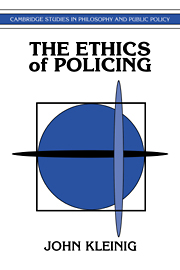Book contents
- Frontmatter
- Contents
- Preface
- 1 Introduction: ethics and police ethics
- Part I Professional ethics
- Part II Personal ethics
- 4 Institutional culture and individual character
- 5 Police discretion
- 6 The use of force
- 7 The use of deception
- 8 Entrapment
- 9 Gratuities and corruption
- 10 Public roles and private lives
- Part III Organizational ethics
- Notes
- Index of authors
- Index of subjects
10 - Public roles and private lives
Published online by Cambridge University Press: 05 June 2012
- Frontmatter
- Contents
- Preface
- 1 Introduction: ethics and police ethics
- Part I Professional ethics
- Part II Personal ethics
- 4 Institutional culture and individual character
- 5 Police discretion
- 6 The use of force
- 7 The use of deception
- 8 Entrapment
- 9 Gratuities and corruption
- 10 Public roles and private lives
- Part III Organizational ethics
- Notes
- Index of authors
- Index of subjects
Summary
Surely the fact that a uniformed police officer is wearing his hair below his collar will make him no less identifiable as a policeman.
Thurgood MarshallAs a law enforcement officer … I will keep my private life unsullied as an example to all.
Law Enforcement Code of EthicsThe distinction between public and private has never been clear either in theory or in practice. Yet it has often been thought an important distinction for liberal theory. Liberalism seemingly acknowledges a sphere within which the individual should be permitted to act without interference from either the state or other parties. The great liberties – freedom of thought and religion, and freedom of speech – have been thought to belong to this protected sphere, along with all manner of other so-called self-regarding conduct, matters of lifestyle, to the extent that such conduct does not infringe on the legitimate interests of others.
But once we get beyond the elevating rhetoric, it becomes much more difficult to isolate a relevant “zone of privacy,” or at least to isolate it in any stable manner. There are many reasons for this. One is to be found in the sheer complexity of the public/private distinction. There is no simple way of drawing it. As marital rape legislation has recognized, what is done in private in a relationship that is generally regarded as private may not be a private matter.
- Type
- Chapter
- Information
- The Ethics of Policing , pp. 188 - 206Publisher: Cambridge University PressPrint publication year: 1996



